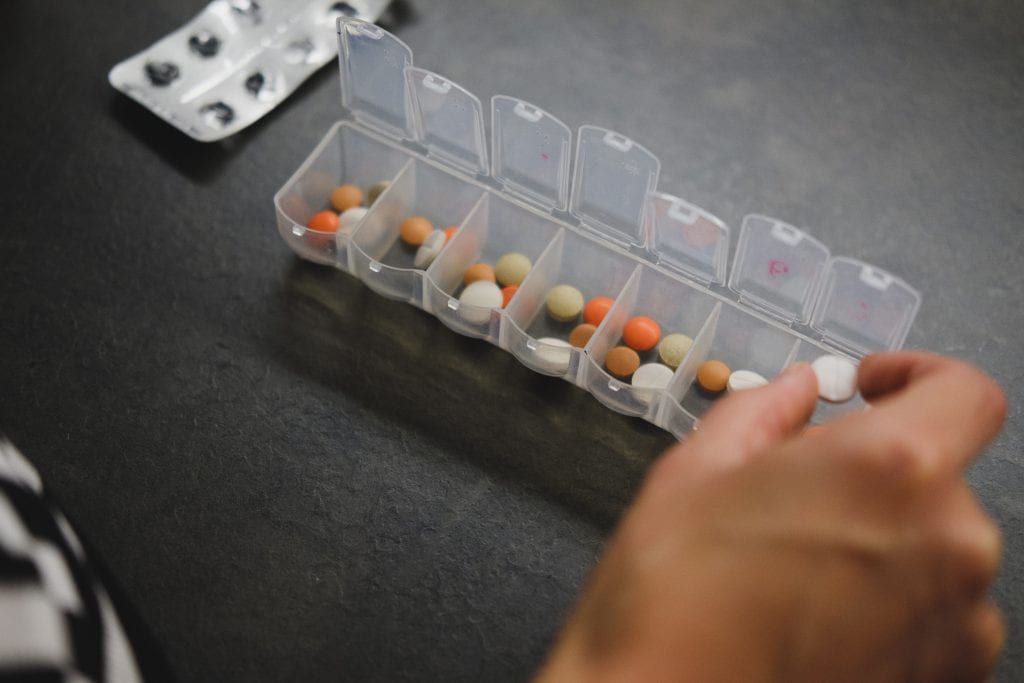Our Recovery Program – Pharmacological Treatment

Pharmacological or Medicated-Assisted Treatment
As part of our individually-centered treatment program, Heartland House focuses on different areas of recovery assistance. As indicated on our core programs page, one of these elements is assisting men in pharmacological or medicated-assisted treatment that has been prescribed by their physician or psychiatrist.
When they first stop using drugs and alcohol, some individuals go through painful withdrawals that can be medically dangerous to their physiology and require them to undergo medication-assisted detox. Often the medications used in this process are prescribed by the client’s doctor or psychiatrist, as there are certain medications that we do not prescribe or administer on the Heartland House campus. There is a number of types of medicated-assisted treatment that we are able to provide to our clients.
Here is a list of the common ones that we administer:
Naloxone
Residents who have entered Heartland House with opioid addiction may need certain medication that’s designed to eliminate cravings. One of these is oral naloxone, a medication that was developed in the early 1960s and approved in 1971 by the FDA for the treatment of opioid overdoses (reference). Naloxone has more recently been developed into a nasal spray, by the name of Narcan, that can immediately treat the symptoms of opioid overdose (reference).
Methadone
Methadone was originally developed in the 1930s by German scientists as a treatment for pain that was less addictive than morphine. Methadone made its way to the United States in 1947 but wasn’t really used for the treatment of substance use disorder until the early 1970s, when scientific advancement and government regulation caught up (reference). Methadone is taken orally daily. It can usually be taken at home or administered at a clinic. For our Heartland House clients who have a prescription for Methadone, our professional staff will store it in a securely locked location on-site and dispense it to them for their once-daily dose.
Methadone is intended for temporary use to wean a patient off of certain drugs such as opioids. When used properly, Methadone can make the detoxification process safer and easier to bear, which in turn assists the patient in grasping sobriety so that are better able to focus on making long-term behavioral changes. Methadone can be slightly addicting with long-term use. With that in mind, our staff does not administer Methadone, but we hold it for the patient to take as prescribed by their doctor.
Suboxone/Subutex
Suboxone and Subutex are similar to Methadone in that they are taken daily and used to taper off from opioid addiction. Suboxone is different from the other two medications in that it keeps the patient active neurologically while concurrently reducing craving that diverts the patient’s focus from behavioral changes. As with any medications, it’s critical to understand the risks and side effects and to take them precisely as prescribed.
Suboxone can also be addictive and, like methadone, is not intended for the long-term. As with methadone, our staff assists clients with self-administering their doctor- or therapist-prescribed dosages.
Vivitrol
Vivitrol is another medication option that has a different effect than Methadone and Suboxone. Rather than helping to wean the client off of opioids, Vivitrol blocks the neurological effects of opioids and Oxycontin, preventing the user from feeling any high from using those substances.
Vivitrol injections are not prescribed or administered at Heartland House, but our staff will arrange transportation for clients to get to their physician’s office to be given an injection if Vivitrol is prescribed for them. Additional advantages of Vivitrol include that it can help prevent STDs from intravenous drug use, reduce emergency ER visits, and it is an effective alternative for the client with co-occurring issues who have trouble taking a daily medication, as the client merely needs to see their physician once each month for their injection.
Medication-Assisted vs. No Medication
Because our focus at Heartland House is on individually-centered treatment, we strive to thoroughly and professionally assist every client in their recovery regardless of which aspects of the Heartland House program they are partaking. The client on a medication-assisted program is considered the equivalent of any other sick person who needs medication, such as the diabetic who requires insulin. We promote long-term recovery with the same methods for those who are on a medication-assisted program for those who are not.
For more information on Heartland House’s program and how we assist men with their treatment program regardless of their medication status, feel free to contact us via the link below and we’ll be happy to answer any questions you may have.

Recent Comments